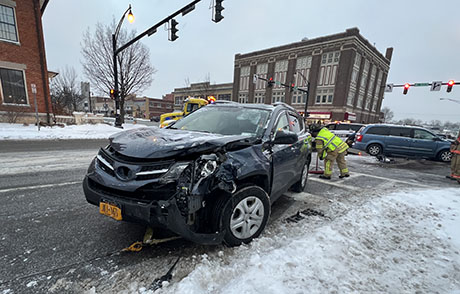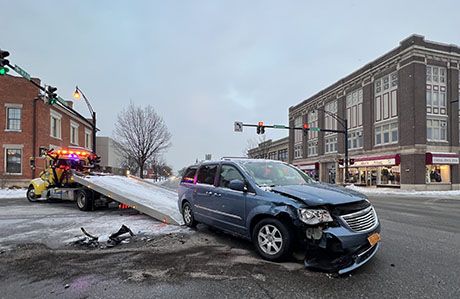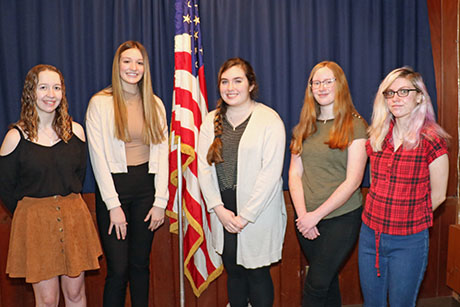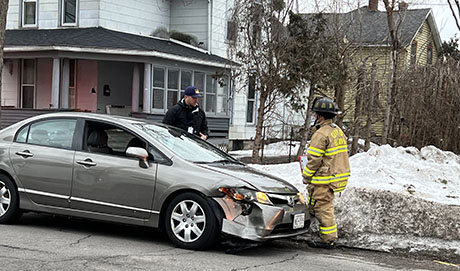Article by Sharon Burkel
Batavia Cemetery Association
Many famous and influential citizens are buried in the Historic Batavia Cemetery on Harvester Avenue, and their stories are familiar to many. The founding families of Batavia: the Ellicotts, the Richmonds, the Brisbanes, and the Carys; the Confederate soldier Philemon Tracy and his uncle, Judge Phineas Tracy, who brought Philemon’s body back over enemy lines for burial; and the infamous William Morgan, the man who threatened to reveal Masonic secrets, was kidnapped and disappeared. But every stone in a cemetery represents the story of a person who played a part not only in the lives of their friends and family but also in building the fabric of the community. Sometimes their stories get lost in time, especially when there is no gravestone.
Such is the case of Watson Bullock, a Black entrepreneur, businessman, and activist who lived in LeRoy and Batavia in the late nineteenth and early twentieth centuries. Russell Nephew, a Batavia resident who collects Batavia artifacts, contacted the Batavia Cemetery Association after he received a request from Glenn Hinson, Associate Professor of Folklore and Anthropology at the University of North Carolina, Chapel Hill. Professor Hinson is doing research on the Bullock family and inquired if Watson is buried in the Historic Batavia Cemetery on Harvester Avenue. The cemetery’s old records show that Watson, his wife Martha, and four of his children rest in the northeast corner of the cemetery. Mr. Nephew and this writer walked the cemetery to find their graves, and discovered they are all unmarked.
Ruth McAvoy writes in her book The History of Batavia, “One family that contributed to the local area was that of the Watson Bullocks who for many years lived at 113 Liberty Street. The Bullocks moved to Batavia from LeRoy about 1880. For years, the Bullocks ran a drycleaning establishment and manufactured and sold bluing (which adds a trace amount of blue dye to white fabric during laundering to improve its appearance) in bottles that still turn up in local dumps. A manuscript history of the Free Methodist Church identifies Watson Bullock as the man who preserved the $50 from the sale by the church of the Holland Land Office and made sure that the money would be available when the Methodist Society was ready to purchase a new place of worship. He was also one of the founders of the Emancipation Celebration Society.”
Mr. Bullock was born in North Carolina sometime in 1844 and moved to LeRoy after the Civil War with his family, who were reported to be ex-slaves. In 1871, a newspaper ad in The LeRoy Gazette shows he was cleaning and repairing clothes in LeRoy, which continued until he married the widow, Martha Butler, on May 6, 1878. She was a hairdresser in LeRoy. Business ads in The Daily Morning News indicate that in October 1878, they moved to Batavia to establish a dyeing and cleaning business at 104 Main Street; that in April 1880 they moved their home and business to the southwest corner of East Main and Cemetery Streets (now Harvester Avenue), and again in June 1880 to 6 State Street. The Batavia Daily News ads show they moved in July 1881 to 25 Jackson Street, in 1889 to 30 Liberty Street, in 1891 to 9 South Liberty Street, and in 1902 to 113 South Liberty Street, where they remained until Watson’s death on March 21, 1918. During these years the Watsons manufactured and sold liquid bluing, five different colors of ink for dyeing, created the “London Carpet Renovator” to clean carpets in place, repaired and cleaned clothes, and sold second-hand household items and clothes, books, notions, and patent medicines.
The Bullocks’ life was not easy. Professor Hinson relates that they lost seven of their eight children by 1890 and wrote, “That’s a long hard list…and with none living more than ten years.” Three of the children buried in the Batavia Cemetery died within four months in 1890 of consumption (pulmonary tuberculosis): Hattie, on July 19th, aged 1 year, 3 months; Edmund, on September 2nd, aged 6 years; and Watson, on November 15th, aged 1 year, 7 months. The fourth child, Eva Estelle, died on August 4, 1871, aged 9 years.
An article by Alice Zillman Chapin in The Batavia Daily News dated Saturday, April 8, 1961, entitled “There is Civil War Issue Behind Church’s Centennial,” tells that a “mystery book,” which had been discovered in the attic of the Cattaraugus Free Methodist parsonage in 1959, revealed that the Batavia Free Methodist congregation in Batavia had been founded in April of 1861, not 1878 as they had previously thought. The Free Methodists were staunch abolitionists and had broken with the Methodist Episcopal Church throughout the United States.
Chapin writes, “It was an ex-slave from North Carolina, Watson Bullock, who was responsible for keeping the newborn Batavia Free Methodist Church on its feet. Under his leadership, meetings were held in two rooms of the house at the west corner of East Main and Harvester Avenue. Strangely enough, by 1880, the Holland Land Office entered the picture. The building was purchased by the Free Methodists from Ruth Bryan whose mother had conducted the Bryan Young Ladies’ Seminary there. Church meetings were held on one side of the building, which was, according to records, divided by a long hall. Apartments made up the other side.”
Chapin continues, “With finances somewhat shaky, the little band of Free Methodist pioneers sold their historical Land Office church to Kate and Edna Clapsaddle Lawrence…. With much foresight, the ex-slave, Watson Bullock, held the money from the Land Office sale in trust, feeling certain that somehow, someway, the Batavia group would be able once again to purchase their own church building. Church records show, interestingly enough, that there was some dispute as to how the funds should be spent, but Mr. Bullock staunchly guarded the money for four years. By 1893, with funds from the Bullock account, the half-completed property at Ellicott St. and Linwood Avenue was purchased. The Batavia Methodist Episcopal Church had abandoned plans for the building and put the unfinished structure up for sale. Originally the Free Methodists planned it as a mission to the foreign-born of the city but it later became their church home.”
Although they suffered unimaginable grief in the loss of their children, Watson and Martha were always concerned about their community and fellow man and faithful to their church. Articles in The Daily News reported they collected clothing for the “…suffering colored refugees of Southern Kansas…” after a nine-month drought in 1880-81, allowed their business at 9 South Liberty Street to be used as a District 6 polling place in 1891, and held Free Methodist prayer and home missionary society meetings at their different homes. In 1900, Watson was sworn in as an officer (Orderly) of the Salvation Army. He had a float in the 4th of July parade in 1907 and was elected as an alternate delegate for District No. 5 to the Prohibition County Convention in 1910. He donated 10% of his sales in December 1914 to the Belgian Relief Fund as the German-occupied country was suffering great food shortages in World War I. In 1917, Watson was elected chairman of the new Emancipation Celebration Society.
The Daily News reported Watson’s death on March 21, 1918:
Well-Known Resident Died Following Stroke of Apoplexy
“Watson Bullock died about 6 o’clock this morning at his home, Number 113 South Liberty Street. He had been confined to his bed about ten days and it was believed that he suffered a stroke of apoplexy (cerebral hemorrhage).
Mr. Bullock was 73 years old and had resided in Batavia about 50 years, being well-known and respected. He was a trustee of the Free Methodist Church of Ellicott Street and was an active supporter of the Salvation Army. For several years he manufactured and sold blueing in wholesale and retail quantities and in recent years he had conducted a secondhand store. Besides his wife he is survived by son, John Bullock, a daughter, Miss Adeline Bullock, both of whom reside at home, and a stepson, George Butler of Beaver Falls, Pennsylvania.
Mr. Bullock came north with his parents from North Carolina, where the family was in slavery before the Civil War. The family lived in Leroy for a short time, before coming to Batavia.”
Alice Chapin also wrote about Bullock’s passing, “Watson Bullock was widely loved and respected by townspeople of all faiths in Batavia. Readings in the ‘mystery’ record book tell that in 1918, when he died, the Free Methodist Church that he so dearly loved, was crowded with prominent people who came to honor him for his faithfulness to his God, his church and his community.”
On April 6, 1918, The Daily News reported the value of Watson’s estate as “…$4,650, of which $450 is in personal property.” ($85,650 today!) It was left to Martha as executrix and would go to the children at her death. Sadly, Martha Bullock died May 2, 1936, at the age of 89 at the Genesee County Poor Farm in Bethany.
The Free Methodists sold their building on Ellicott Street to Mt. Zion Baptist Church and built a new church on Bank Street in 1968, which is now Arbor House, part of Northgate Free Methodist Church. When the new church was dedicated, Dorothy Parker wrote in The Daily News on April 27, 1968, that according to a history written by longtime parishioner Mrs. Erwin Worthington, “Watson Bullock, an ex-slave who had operated a large dry cleaning business in Le Roy and Thomas Hill, body servant to a Confederate officer, were members of this early church.” She also recounts that the Holland Land Office building was sold for $500, not $50 as McEvoy said and that the money was ‘…banked by Watson Bullock, rather than returned to the church conference as was customary. Mr. Bullock was determined to re-activate the church in Batavia.’”
For many years, it was thought that the only person of color buried in the Historic Batavia Cemetery was a woman named Addy. The inscription on her stone reads, “For 46 years the faithful colored servant of the Reverend Lucius Smith and family. Died January 28, 1857, aged 50 years.”
The Association thanks Professor Hinson and Russell Nephew for bringing to light the story of the Bullock family and their contributions to the Batavia community. Every soul in a cemetery has a story, and they all deserve to be remembered.
Previously: In 1921, Matthew Bullock fled to Batavia on his way to Canada to escape lynching








